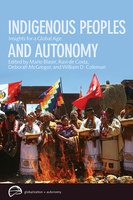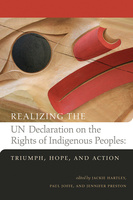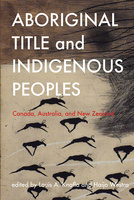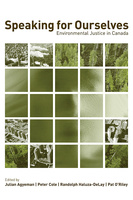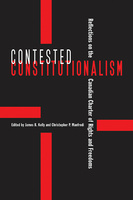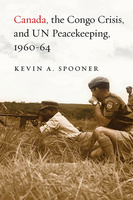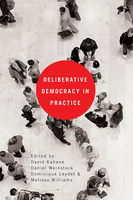Voting Behaviour in Canada
Leading young scholars of Canadian political behaviour explore long- and short-term influences on voting behaviour and reveal the nuances and challenges of understanding election results in Canada and other modern democracies.
Indigenous Peoples and Autonomy
Insights for a Global Age
This book looks at how indigenous peoples in various contexts have thought about, and responded to, the pressures that globalization has on their cultural, political, and geographical autonomy.
Realizing the UN Declaration on the Rights of Indigenous Peoples
Triumph, Hope, and Action
A multidisciplinary collection analyzing the development of the Declaration, the triumph of its adoption, and the hopes and actions for its implementation.
Aboriginal Title and Indigenous Peoples
Canada, Australia, and New Zealand
Offers a perspective on Aboriginal title and land rights that extends beyond national borders and the contemporary context to consider historical developments in common law countries.
Media Divides
Communication Rights and the Right to Communicate in Canada
Media Divides offers the first comprehensive, up-to-date account of the democratic deficits in Canada’s communications law and policy.
Cultural Autonomy
Frictions and Connections
Offers a multifaceted perspective on how global changes in the organization of power have transformed the ability of individuals and communities to create their own meanings.
Constitutional Politics in Canada after the Charter
Liberalism, Communitarianism, and Systemism
The first systematic analysis of general theories about Canada’s post-Charter constitutional evolution.
Quebec Women and Legislative Representation
This book examines the under-representation of Quebec women in Quebec’s National Assembly and in Canada’s House of Commons and Senate from 1791 to the present.
Speaking for Ourselves
Environmental Justice in Canada
This book showcases the work of Aboriginal and non-Aboriginal scholars who uphold environmental justice as the path to a more just, equitable, and sustainable Canada.
Pearson's Peacekeepers
Canada and the United Nations Emergency Force, 1956-67
Pearson’s Peacekeepers describes Canada’s role in the first peacekeeping effort mounted by the UN and uncovers realities, and challenges, that lie beneath the myth of Canada’s peacekeeping mission.
Contested Constitutionalism
Reflections on the Canadian Charter of Rights and Freedoms
Contested Constitutionalism is a critique of Canadian democracy, judicial power, and the place of Quebec and Aboriginal peoples within the federation, all of which have been altered by the Charter’s introduction in 1982.
Canada, the Congo Crisis, and UN Peacekeeping, 1960-64
Canada, the Congo Crisis, and UN Peacekeeping, 1960-64 reveals the complex web of influences that shaped Canada’s relationship with Africa and its involvement in UN peacekeeping.
A Perilous Imbalance
The Globalization of Canadian Law and Governance
Tackles the pressing question of how Canadian engagement with globalization can be marshaled to advance rather than impair human security, ecological integrity, and social emancipation.
The Politics of Procurement
Military Acquisition in Canada and the Sea King Helicopter
A history of failed attempts to replace the Sea King maritime helicopter reveals the political nature and shortcomings of the Canadian defence procurement process.
Deliberative Democracy in Practice
Leading theorists debate the strengths and limitations of deliberative democracy in theory and practice.


